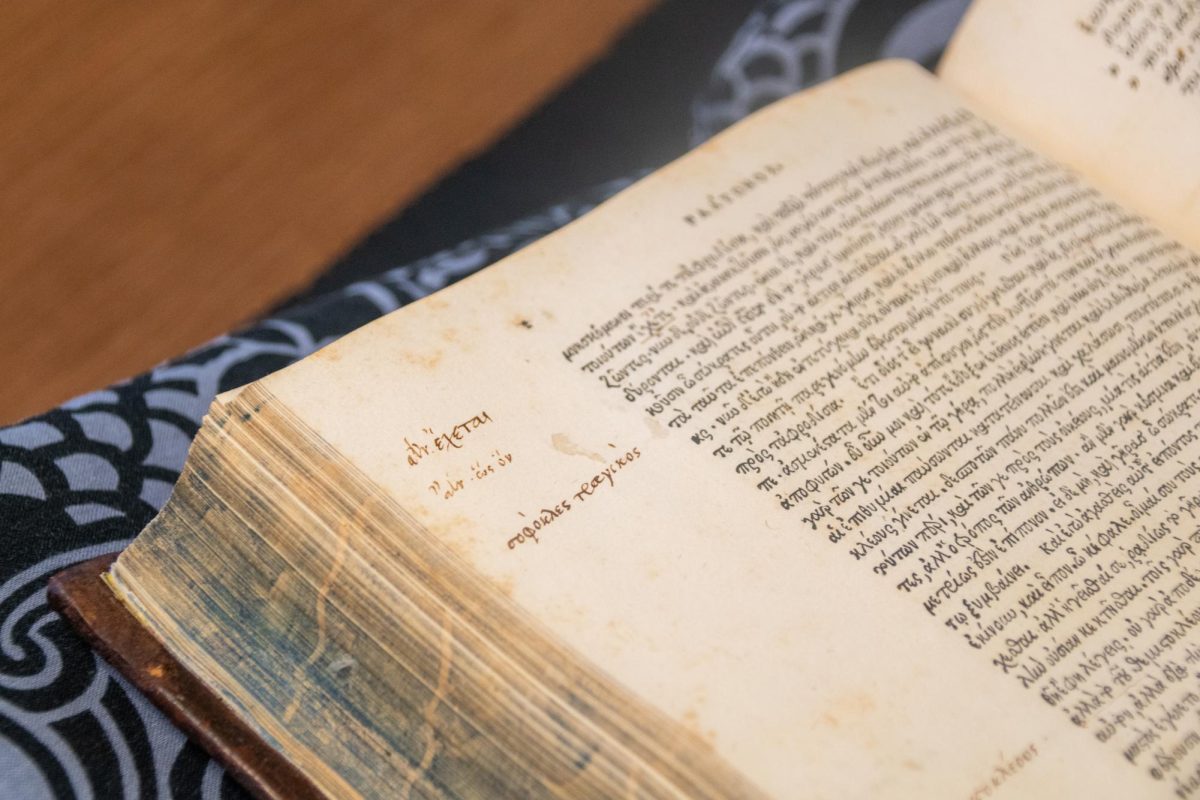Last updated on Feb. 25, 2024 at 10:18 p.m.
The University has received the first printed edition of Plato’s works in Greek. This book, inbound with cowskin vellum, was first printed in 1513 by Aldus Manutius, a Venetian printer and publisher. The book was shipped from Massachusetts to the University and is now stored in the Rare Book and Manuscript Library at the Main Library.
“Aldus Manutius is a very important printer because he democratized the book, in the sense that he produced editions that were far more portable than typical books during the period that were produced by his contemporaries,” said Lynne Thomas, head of the RBML. “He was making classical works available to scholars for the first time in the 16th century in a way that they had never been available before.”
Manutius was also the first person to ever use italics, Thomas said.
“Aldus Manutius determined that using italics meant you could put more words on the page than if you did in straight,” she added.
Get The Daily Illini in your inbox!
Aside from his contribution to the development of publishing, this book also provides readers and scholars with a more comprehensive understanding of Plato, his knowledge and his life.
“Whatever we know about Plato today comes from this book,” said Elias Petrou, professor in LAS and librarian for classical medieval and modern Greek studies at the University.
The RBML was established in 1939 and is one of the largest academic rare book libraries in the nation. It holds at least half a million volumes and approximately two miles of manuscript materials, which ranges from a collection of modern poetry, the history of science and the history of publishing, to early books before the 1890s in America, Thomas said.
Last November, the RBML obtained the first complete edition of Plato’s work in the Greek language by Aldus Manutius, adding one more important work to its current collection.
The book was originally dedicated to Pope Leo X when he became pope the same year as the book was published.
“This book was dedicated to him as a token of appreciation showing that he will promote the Greek classical studies in Italy and the Western world,” Petrou said. “So it contains all the works of Plato.”
According to Cait Coker, associate head and curator of RBML, the book also played an important role in establishing and advancing typographic technologies and skills.
“It is a landmark work because it is the first complete edition of Plato,” Coker said. “This was the foundation for the other printed editions of Plato. And because of the perfection of its typography and so much else, it was really a milestone of typographic engineering.”
Thomas also mentioned that printing the book in the Greek language was challenging and complex during the period.
“This is the first really solid creation of a typographical font for Greek,” Thomas said. “And it’s a really complex thing to do linguistically because of all of the diacritic marks in Greek. There are multiple variations for every letter of the alphabet.”
Coker later elaborated on Thomas’ statement, adding that printing this book in Greek required the printer to produce a great number of different types.
“For this edition, there are over 1,300 different letters they had to create because each piece has to be handset, so each letter is a physical object that has to be printed,” Coker said.
Because of the book’s revolutionary influences on the academic areas and technical skills, acquiring this important work brings both value and access for scholars and students at the University.
“To be able to add it makes our collection fuller, deeper and more important, but it also makes more materials available to scholars and to people who are just curious and interested,” Thomas said.
“It is in mint condition,” Petrou said. “It is with a good quality of paper. It almost looks untouched by time, although it’s already five centuries old. The ink looks so well pressed, like it was printed yesterday.”
Along with the library’s other collections, this book will be moved to the new building in 2026, according to Thomas.
The University is also working on turning this book into a digital version to allow people to access Plato’s work remotely and preserve it from excessive human physical contact.
“One of the priorities is digitization, hopefully, so everything is going to be available online, and that way more people can see at the same time,” Petrou said. “It is going to preserve the book from people’s touching.”
As property of the state of Illinois, the book is fully available for everyone and is ready to be served for anyone who would like to see it in the library, Thomas said. Individuals can walk into the library or use the school library catalog online to place a request for an in-person visit to see Plato’s work at the RBML anytime during opening hours from Monday to Friday.
“We are just open to the world — to anyone who is interested in Plato and anyone who is interested in the book,” Petrou said. “Plato is here for them.”













